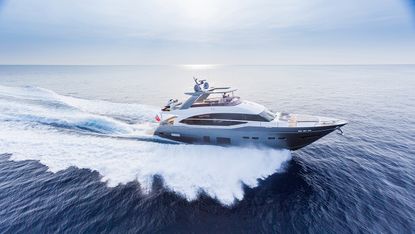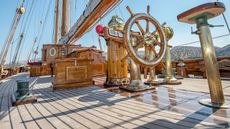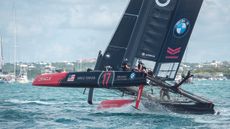Princess Yachts and the art of craft
Having spent a decade with McLaren, the luxury-yacht company's MD Antony Sheriff is no stranger to opulence. But how do the two compare?

The truth is, nobody needs a supercar. All you really need is a Fiat Panda – then all the traffic goes away, fuel efficiency goes up. Nobody needs to go as fast as a supercar will take you. But it's not about that. It's an object of desire. And a boat is the same thing – it's an absolute luxury. Indeed, people speak of yachts having an image problem, as totems of excessive wealth, but that's because they're still rare. Bentleys are a dime a dozen now. There was a time you'd see one and want to take a look at who was driving, but not any more. A yacht still has that draw. It's more a means of personal expression – even a private jet is, by contrast, ultimately just a tube, regardless of what you do to it inside. Besides, people who own yachts tend to really use them because they're not just about getting from A to B. They offer a different type of lifestyle, and access to a real community of like-minded people.
I'll admit that I'm really a car guy – I haven't spent much time on the water yet, though I've found that, when I do, one perk of the job is it's a very nice place to have a meeting. The new job has been a touch disorientating to me. But I love making things, and that's what boat-building is all about: the craft. We have metalworking, woodworking, moulding, real hands-on making, and nearly all of it happens in one place – in Plymouth, with all that shipbuilding heritage.
What's really surprised me is the efficiency with which a new boat is delivered – it's less complicated than with a car. The car industry has all those resources – the people, the money – and yet typically puts out fewer products than most boat builders. We could develop a boat in the same time and for the same resources that some car companies spend coming up with a set of door handles. And I'm not joking – I've seen it time and time again, where the administrative side of car-making gets so big that the level of overheads is unsustainable unless production increases.
Subscribe to The Week
Escape your echo chamber. Get the facts behind the news, plus analysis from multiple perspectives.

Sign up for The Week's Free Newsletters
From our morning news briefing to a weekly Good News Newsletter, get the best of The Week delivered directly to your inbox.
From our morning news briefing to a weekly Good News Newsletter, get the best of The Week delivered directly to your inbox.
This isn't to say boat-building couldn't learn from the car industry. Boat-building could have a much more systemised means of production, for example, and I say that as head of a company that produces, on average, a £1.5m boat every day. It's been slow to take on technology that could provide more efficiency – quieter engines, for example – while the car industry takes on too much tech for tech's sake. I'd like to see Princess offer more advantages of technology. Coming from McLaren, I just can't help myself.
But technology can't ever get in the way of beauty. Unfortunately, that's what so many boat-builders sacrifice first when trying to push design. In car design they actually talk about 'boat curves' – those lovely flowing lines you see in 1950s and 60s classic cars in particular. But a lot of boat designs now are all jagged edges because there's a sense that it's in some way more impressive. Of course, different people have different tastes. But I think if you're spending the kind of money a yacht entails, you want to be able to look at it and love it. And for me, that means curves.
ANTONY SHERIFF is the chairman of British luxury yacht-builders Princess, a company he joined this year after a decade as managing director of supercar manufacturer McLaren Automotive; princessyachts.com
Create an account with the same email registered to your subscription to unlock access.
Sign up for Today's Best Articles in your inbox
A free daily email with the biggest news stories of the day – and the best features from TheWeek.com
-
 UAW scores historic win in South at VW plant
UAW scores historic win in South at VW plantSpeed Read Volkswagen workers in Tennessee have voted to join the United Auto Workers union
By Peter Weber, The Week US Published
-
 Today's political cartoons - April 22, 2024
Today's political cartoons - April 22, 2024Cartoons Monday's cartoons - dystopian laughs, WNBA salaries, and more
By The Week US Published
-
 Ukraine cheers House approval of military aid
Ukraine cheers House approval of military aidSpeed Read Following a lengthy struggle, the House has approved $95 billion in aid for Ukraine and Israel
By Peter Weber, The Week US Published
-
 Trip of the week: yachting in the Caribbean
Trip of the week: yachting in the CaribbeanThe Week Recommends Sailing around the Caribbean offers ‘some of the most dramatic tropical scenery on Earth’
By The Week Staff Published
-
 Sailing adventures from British shores
Sailing adventures from British shoresfeature Sail a whelk boat in Norfolk or tour the UK in a Thames barge
By The Week Staff Published
-
 Ben Ainslie on his mission to bring home the ‘Auld Mug’
Ben Ainslie on his mission to bring home the ‘Auld Mug’Speed Read The Rolex testimonee will skipper Ineos Team UK in sailing’s America’s Cup
By Alexandra Zagalsky Last updated
-
 Three of the best yachting adventures
Three of the best yachting adventuresSpeed Read
By The Week Staff Last updated
-
 Barbados Sailing Week: life on the ocean wave
Barbados Sailing Week: life on the ocean waveIn Depth The Week Portfolio heads to the Caribbean island for the thrills and spills of Barbados Sailing Week
By Augustin Macellari Last updated
-
 Three of the best holidays on Britain’s waterways
Three of the best holidays on Britain’s waterwaysSpeed Read
By The Week Staff Last updated
-
 Ship to shore: Ben Ainslie collaborates with Chucs
Ship to shore: Ben Ainslie collaborates with ChucsIn Depth An inside look at the clever collaboration that keeps the British team looking smart during the America's Cup
By The Week Staff Published
-
 How new technology is changing the America’s Cup
How new technology is changing the America’s CupIn Depth Jimmy Spithill, of Oracle Team USA, explains how technology has turned modern boat racing into an experience akin to flying an aircraft
By Jimmy Spithill Last updated